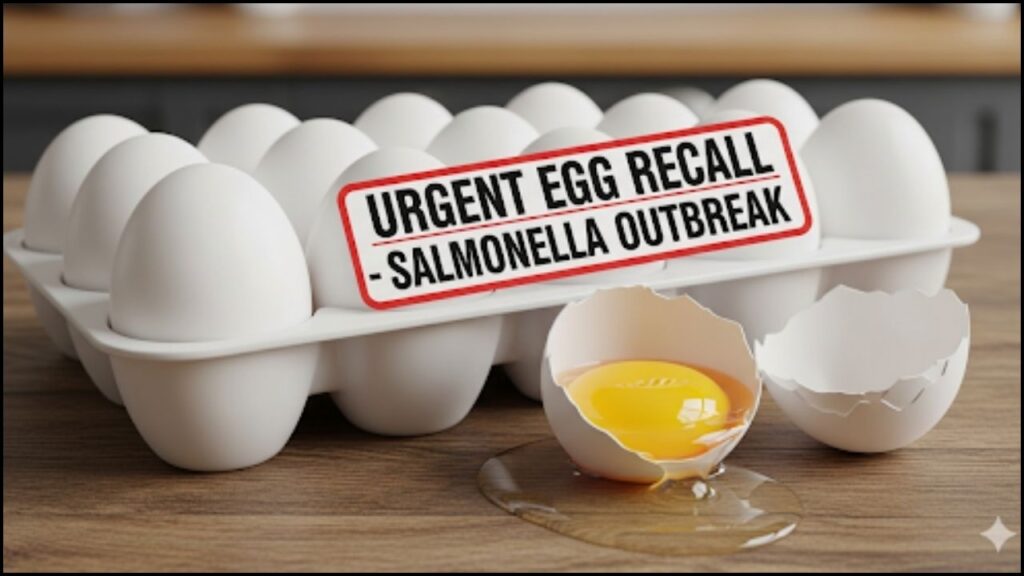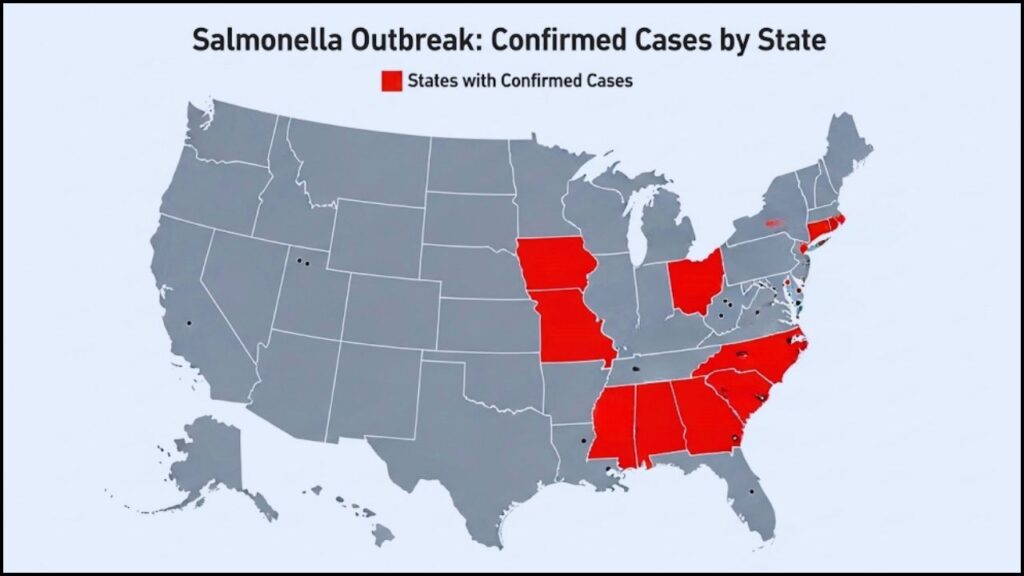
Federal health officials are investigating a multi-state Salmonella outbreak that has sickened at least 95 people, prompting an urgent egg recall from a major agricultural producer. The U.S. Food and Drug Administration (FDA) announced the voluntary recall by GoodValley Farms on Friday, advising consumers to check their refrigerators for the affected products.
Key Facts of the Recall and Outbreak
| Key Fact | Detail / Statistic |
| Products Recalled | GoodValley Farms and MeadowLane brand large white and brown eggs in 12- and 18-count cartons. |
| Illnesses Reported | 95 confirmed cases, including 22 hospitalizations. No deaths have been reported. |
| Affected States | Cases identified in 12 states: CA, CO, AZ, TX, IL, OH, PA, NY, MA, FL, GA, NC. |
| Identifying Information | Lot codes between GVF-213-25 and GVF-235-25, with “Best By” dates up to September 25, 2025. |
Details of the Urgent Egg Recall
The recall impacts several brands produced by Good Valley Farms, a company that distributes to major grocery chains across the United States. The Centers for Disease Control and Prevention (CDC), in collaboration with the FDA and state health departments, linked the illnesses to eggs originating from a Good Valley facility in the Midwest through epidemiological and traceback investigations.
Which Products Are Affected?
Consumers are urged to check cartons for the following identifying marks:
- Brand Names: GoodValley Farms, MeadowLane Organics
- Carton Sizes: 12-count and 18-count
- Plant Number: P-1084 printed on the carton
- Lot Codes & Dates: Any carton with a lot code beginning with “GVF” and a “Best By” date ranging from September 10, 2025, to September 25, 2025.
“We are taking this action out of an abundance of caution and a commitment to the safety of our customers,” said a spokesperson for GoodValley Farms in a statement. “We are working closely with the FDA and CDC to determine the root cause of this issue.”
What Consumers Should Do

Health officials advise against consuming, selling, or serving the recalled eggs. Consumers who have purchased the affected products should either discard them immediately in a sealed container or return them to the place of purchase for a full refund. The FDA stresses the importance of thoroughly cleaning and sanitizing any surfaces, containers, or utensils that may have come into contact with the raw eggs to prevent cross-contamination.
Scope of the Multi-State Salmonella Outbreak
The ongoing CDC investigation has traced the outbreak of Salmonella Enteritidis to the recalled eggs. Illnesses began on dates ranging from July 5 to August 20, 2025. The median age of those sickened is 34, with cases ranging from infants to 88 years old. Of the 95 reported cases, 22 have resulted in hospitalization, which the CDC notes is a higher-than-average rate for Salmonella infections, indicating a potentially more virulent strain.
“Interviews with sick people show that eating eggs, particularly undercooked eggs in restaurant and home settings, was the likely source of this outbreak,” said Dr. Laura Gieraltowski, lead epidemiologist for the CDC’s Foodborne Outbreak Response Team, during a press briefing. “The investigation is rapidly evolving, and we may see more cases reported as we continue our work.”
Understanding the Health Risks and Official Response
Salmonella is a bacterium that can cause serious and sometimes fatal infections, particularly in young children, frail or elderly people, and others with weakened immune systems. This food safety issue highlights the ongoing challenges of preventing contamination in the nation’s food supply.
What is Salmonellosis?
Healthy individuals infected with Salmonella often experience fever, diarrhea (which may be bloody), nausea, vomiting, and abdominal pain. Symptoms typically begin 6 hours to 6 days after infection and last 4 to 7 days. In rare circumstances, the infection can spread from the intestines to the bloodstream and other parts of the body, producing more severe illnesses that require immediate medical attention.
“Contamination can occur when bacteria from an infected hen’s reproductive tract are passed into the egg before the shell forms,” explained Dr. Sarah Klein, a food safety expert at Cornell University. “While modern farming practices have reduced this risk, no system is perfect, which is why rapid traceback and recalls are critical public health tools.” The FDA is conducting inspections at the implicated GoodValley Farms facility to identify the source of the contamination and ensure corrective measures are implemented.
The investigation into the full distribution chain of the recalled eggs is ongoing. Officials have not ruled out the possibility of additional recalls and expect the number of illnesses to rise as more cases are identified and reported to public health authorities. Consumers are advised to monitor the CDC and FDA websites for the latest updates on the investigation.
Over 40,000 Pounds of Ground Beef Recall Across Several States Due to Plastic Contamination
